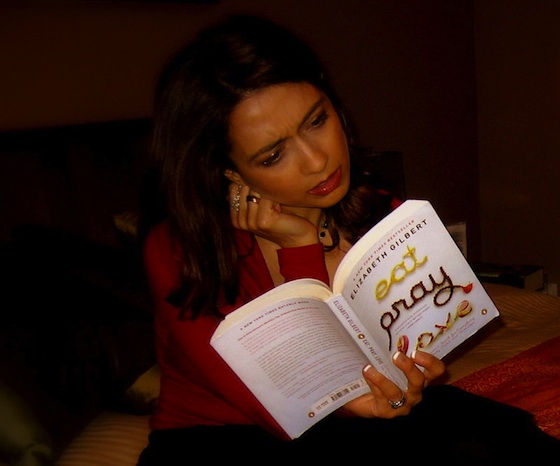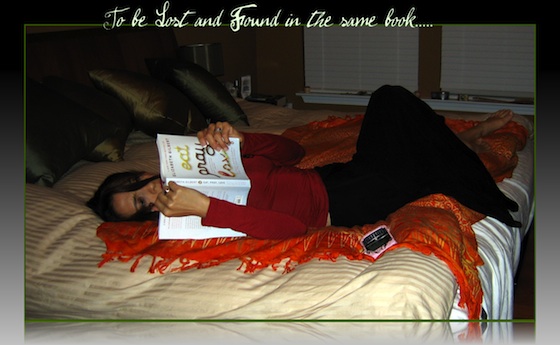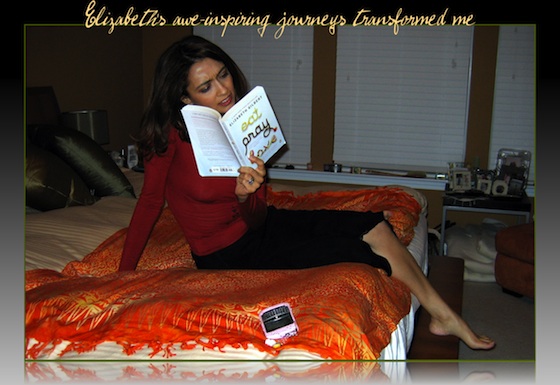Truth be told, I do not closely follow any best sellers list; I do not make it a point of watching Oscar-nominated movies or popular TV shows. No, I follow my own heart when I choose my entertainment, and so should you. I do not have a particular strategy for choosing my next book either except that it must intrigue me. I peruse Amazon reviews more often than the New York Times best seller list or Oprah’s book club. I usually read the first page and a few random pages of the book – no, not the last page, I am no Harry – to make sure the writing is tolerable and the story worthwhile. I would love to read one great book after another but I do not make that my goal. I like how different books and authors stir up unique emotions and sensations in me. Reading “eat, pray, love“, whilst one of the best sellers and most popular books, happened to stir in me many delights and yearnings. I loved it through and through.
Elizabeth Gilbert paints a world of joy, bittersweet sorrow, and entertainment in her self-discovery. I find her writings overwhelmingly beautiful. It is not often that I can identify so much with the personality of an author and the yearnings of her search. I hardly have much in common with her situation: She is divorced, lives in NYC, and travels alone to 3 countries in one year of her life. I love her guts. I love that, as a woman, she can so boldly state that she did not wish to have children and that she was unhappy with a great man in her marriage and her fancy apartment in New York. I absolutely admire that she can claim, without any apology, that she cannot find happiness in her seemingly perfect life – oddly enough- a life which until then was her own picture of idealism.
At the age of 34, Elizabeth Gilbert, in all her devotion to pursuit of a dream, decides to give up everything she has built in pursuit of the longing of her heart and a journey of self-discovery. She defies cultural notions that we should be happy if we are married to a good person and that the maternal instinct should kick in right around 30 for a healthy, normal woman. Finally, when her bouts of depression become intolerable, she makes the commitment to that self-discovery and sets off for her one year journey to three countries whose names start with an I – suiting her mission to self-actualization even more perfectly if you care to put significance into small coincidences – Italy, India, and Indonesia.
Elizabeth’s prose is unique and poetic; I was engrossed in her world. Her passages read like a symphony, music to my ears. At the time, I had constantly dreamt of visiting Italy and for lack of no good reason, it had still not happened. Elizabeth Gilbert gave me Italy better than any guidebook or travel journal. She writes with subtlety about her experiences and is herself surprised by the enormous joy she is reaping from it all – watching Italian boys play football in the streets, choosing her gelato flavors carefully, thoroughly enjoying every bite of her food, taking Italian lessons, and engrossing in life as it unfolds in the form of daily routine for the average Italian.
She is an ordinary novice at travel, without so much as preparing an itinerary or making a plan before getting on the road. She experiences horrible incidents of indigestion from the thought of travel alone and has hardly any tolerance for non-ordinary foods and unfamiliar climates. She is as equally unprepared to travel alone on such a self-discovery mission as a child. Yet she gets through it all by exploiting her one key strength: her ease in making friends with anyone, anyone at all.
Our ‘novice’ traveler sets on her journey to the countries of Italy, India and Indonesia, in that order. The order in which she visits her countries carries a significance that she shares like so: Italy is for indulging in life, food, sights, sounds, India is for indulging in health, purity, yoga, meditation, and reflection, and Indonesia is to return to the medicine man she met years earlier, without so much as having a name, address, or a plan to aid her search. The uncertainty and lack of preparation thrills and worries her at the same time – it tests her tolerance for the unknown, and in a bizarre way, seems to cause her to mature and grow to not worry about small details. What is the worst possible scenario? Well, she may just not find her medicine man. Are we conditioned to worry and plan too much during times when the journey needs to take its own course? There is so much at stake if we do not plan – a waste of time, money, resources, a lost opportunity, a frustrating journey – and while all of that is plausible, the unknown still has a thrill and risk has a taste that fills us with envy and curiosity.

I was envious of her journey and adventures. The people she meets and the cultures she experiences, all the while doing what she absolutely wants to do, with utter disregard for what one is “supposed” to do on these types of journeys, set her apart from the rest. She seems to be floating in and out of her daily experiences, not guiding herself to any particular direction and not planning further than her next meal. She lives in the moment, worries far too little and delights far too much in what I would find a frightening and lonely journey. I admire her strength of spirit.
Reading is the best pastime for an active mind! If you like to see the other book reviews, check the index of In Print.
Elizabeth Gilbert tells us poignantly about her struggles in the Ashram in India; these were among my most favorite passages of the book. The experience of Ashram by itself would provide difficult enough for anyone taking on a journey of self-discovery, but particularly for her so recently parting with her indolent, carefree days in Italy. The atmosphere and environment of Italy and India and the nature of her journey in each could not be more in contrast. While in the Ashram, she struggles to adjust. Sitting in meditation for hours. Waking up at the wee hours of the morning to sit in this silence for what seems like eternity. Doing yoga for a while before returning to silence and to more meditation. The discipline, the sacrifices of instant pleasures for the sake of a higher pursuit. These make up some of the core messages of “Eat Pray Love” by the brave and open spirited Elizabeth Gilbert.

The Ashram is eerily quiet for Elizabeth Gilbert’s racing mind. She wears a cheerful countenance and strikes up so much conversation that the Ashram assigns her the role of hostess. She then falls into her silence just as they appoint her to this new position – and has the most delightful conversation in her head on how she would now become the most silent girl in all of Ashram, so silent that they would be pointing at her, admiring her quietness and bare presence.
And this silence eventually breaks through layer upon layer of emotions and brings them to the surface. She faces each with all her might: Years of anger, shame, sadness, sorrow, bitterness, regrets, come flooding in the long periods of silence. After much struggle, she slowly practices acceptance of each and every emotion quite literally – she brings up each emotion, examine and identifies it, talks to it, asks it questions, carries on a soliloquy on its pros and cons, and then after long careful study and examination, she declares accepting it. It is ludicrous and deeply serious at the same time.
In the Ashram, she first learns to accept all of who she is and then starts to fully love all of that person. Unconditionally and unreservedly.
Her adventures in Indonesia are too good to be passed up for the making of a movie. She goes to visit the medicine man who read her palm on an earlier business trip to Bali, and to whom she had promised she would return for a second visit. The simple notion of a promise of a return trip between a single visitor and an old Indonesian man reading palms is ridiculous enough, as Elizabeth admits, yet almost as ridiculous as being in a country in search of a man whose name you do not know. Ridiculous it might be but it does not cause her any worry or anxiety. In fact, feeling strong and healthy from her Ashram deliberations, she welcomes the adventure with open arms.
I admire the most about Elizabeth Gilbert her thirst for adventure; it leaves me green with envy. How she travels to a country so far and away to find a 100-plus year old medicine man she met years ago is an example of Elizabeth’s care-free, risk-loving, it-will-all-work-out attitude, that to me contrasts with her constant worrisome traits. Off she goes to Bali, and through a luck-struck bizarre and ingenious way, she most certainly finds her medicine man and spends the last four months of her adventure in beautiful Bali.
The author’s writing style and personality are both natural, grounded, curious, intoxicating, and filled with struggles – personal struggles to leave difficult periods and habits behind in order to find herself, pure love and adoration of that self, and a spiritual connection with God that only few of us experience in this brief life on earth.

 I am Farnoosh, the founder of Prolific Living. So glad you are here. My mission is to empower you to unblock your creative genius to live your dream life.
I am Farnoosh, the founder of Prolific Living. So glad you are here. My mission is to empower you to unblock your creative genius to live your dream life.